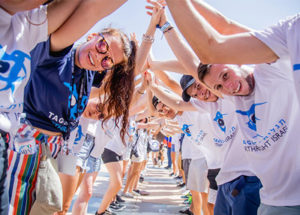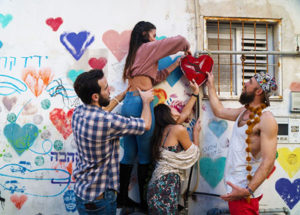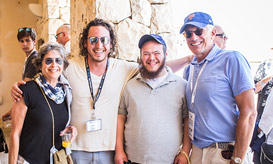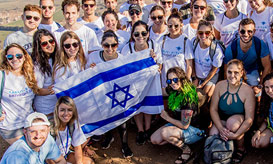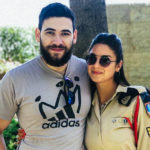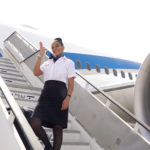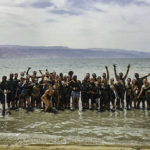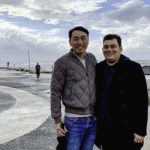I participated in Birthright Israel one year ago. I remember there was something special about our…
The first time I attended Birthright Israel was towards the end of my army service. It was an amazing five days of tours, activities, the sea, Masada, camels, and guitar singing until the wee hours of the night, both in our rooms and sitting by the side of the bonfire. But one thing was not clear to me, “who are the people I joined on their tour, and thanks to them I have five days off from the Army?”
They were happy with a spark of vindication. I had a feeling these people knew something I didn’t understand yet. They laughed and smiled a lot more than the tourists you normally meet in the street or in a souvenir shop. It felt like they had just arrived in the Emerald City from The Wizard of Oz, and now they can finally enjoy the experience they had come for, which they will take back with them.
On the bus, I quickly connected to all the participants. On the Saturday night of our trip, the magic of Birthright Israel first revealed itself to me. Our Tour Educator gathered us together in a local park for the Havdalah ceremony. Some of the participants gathered around the Tour Educator and after a couple of exchanged words and smiles, they burst into song.
So, I come from a traditional home. My grandmother is religious, and my cousin is a Rabbi. For me, prayer and blessings used to be nothing more than historic relics of our culture. But right in front of me that Saturday night on Birthright Israel the participants embraced each other hand in hand singing in a tune of the Havdalah prayer that I did not know. They did not blush or lower their voice; they were there for themselves and no one asked them to join. They seemed happy that this moment had come. I kind of envied them. I realized that I was ashamed of my Judaism. And since then I have been searching for this ‘magic’ I experienced on Birthright Israel everywhere.
I asked one of the girls named Julia where and how she learned to sing Havdalah. She told me about Shabbat in her home community. That she and many of the other girls in their group grew up together. I was intrigued!
How in a country thousands of miles away where Hebrew is not spoken nor a Jewish army fighting? Girls of their own free will, without anyone telling them, without a Chief Rabbi, singing in pure joy. They leave no doubt that their Judaism is a big part of them, just like that. They just grew up on it. I realized that my Israeli identity is not big enough to contain this picture. And here, my Jewish identity was born.
I kept in touch with my new friends from Birthright Israel. We went skiing together during Chanukah and we obviously lit the Menorah together. The ‘magic’ felt stronger abroad with my friends from Birthright Israel than at home. When I visited Julia, I never stopped admiring when I saw her parents’ home and all the Jewish elements in it, such as the blessing over the home, a Siddur, and even a Shofar. Until then, it felt to me that Judaic items were a kind of a compromise between the sacred and the mundane. That if a very religious cousin of mine walks in, it’s there for them to assume we are good Jews. On the other hand, the objects are there specifically not to be touched. But after my experience with my friends from Birthright Israel, I started to want to touch these Judaic items and meet people who want to be engaging Jewishly with me.
I think that my Birthright Israel experience took me in the opposite direction than that of those who come from abroad. I come from a place where the state structure created economic, security and social frameworks, and I have come to a place of understanding that these are people that have Jewish heritage interwoven into their lives from birth. That Jewish culture is an intrinsic part of them in a beautiful way, it is in their heart and is reflected in everything they do.


My family comes from a very respectable rabbinical dynasty and yet I never found much interest in Judaism. A year and a little after my time on Birthright Israel, I began to feel something was missing. The summer I finished university I immediately went to go work at Jewish summer camp in Eastern Europe. I continued to discover for myself that we need a framework of choice that combines both fun and the meaning of Jewish heritage.
This decor will not hold water without a real, honest core behind it. The nucleus that connects the individual to civil society is the community. How can I offer my children a Jewish identity? How can one so naturally integrate Jewish heritage into everyday life?
I think we Israelis can learn a thing or two about Jewish community life from our Jewish brothers and sisters from abroad. In such a setting, it’s obviously about people you know, but what connects you is not work, classes or studies, but a partnership of destiny. A feeling that you were born into each other’s world, that you sing for each other, and meet on holidays with each other. I know for myself I now want to develop my Jewish identity and consciousness more.
I started thinking about my future family. I imagine no longer just a beautiful house to live in. But an entire street where every home is a place where Jewish heritage and culture live in the most natural of ways. That people on the street will see each other as partners in life. Children meet on holidays and learn traditions from each other’s homes. It will be a never-ending social framework rooted in our tradition and culture for the rest of their lives.
I didn’t finish my Jewish discovery journey yet. And I hope to find more of the ‘magic’ I saw during the singing of the Havdalah that Saturday night during my experience on Birthright Israel five years ago.

